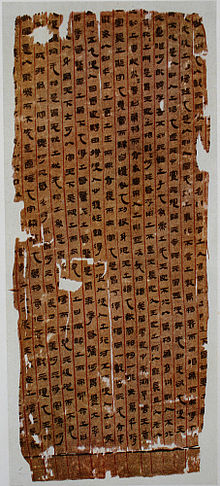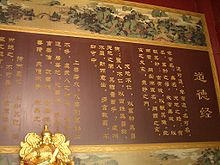User:White whirlwind/Drafts/Dao de jing
 ink on silk manuscript of the Tao Te Ching, 2nd century BC, unearthed from Mawangdui | |
| Author | Laozi (trad.) |
|---|---|
| Original title | 道德經 |
| Language | Classical Chinese |
| Genre | Philosophy |
Publication date | 6th century BC |
| Publication place | China (Zhou) |
Published in English | 1891 |
| Media type | Book |
Original text | 道德經 at Chinese Wikisource |
| Translation | Tao Te Ching at Wikisource |
| Tao Te Ching | |||||||||||||||||||||||
|---|---|---|---|---|---|---|---|---|---|---|---|---|---|---|---|---|---|---|---|---|---|---|---|
| Traditional Chinese | 道德經 | ||||||||||||||||||||||
| Simplified Chinese | 道德经 | ||||||||||||||||||||||
| Hanyu Pinyin | Dàodéjīng (ⓘ) | ||||||||||||||||||||||
| |||||||||||||||||||||||
| Alternative Chinese name | |||||||||||||||||||||||
| Chinese | 老子 | ||||||||||||||||||||||
| Hanyu Pinyin | Lǎozǐ | ||||||||||||||||||||||
| |||||||||||||||||||||||
| Part of a series on |
| Taoism |
|---|
 |

The Tao Te Ching (Chinese: 道德經; pinyin: Dàodéjīng) is an ancient Chinese text that contains a large collection of sayings and aphorisms relating to the concepts of philosophical Daoism. It is, along with the Zhuangzi, one of the two foundational texts of Daoism. The Tao Te Ching is a short work, numbering only 5,000 Chinese characters in length, arranged into 81 brief chapters or sections. Though not a typical literary work, the Tao Te Ching contains frequent use of rhyming in its sayings, and shows a strong tendency to express ideas and principles in enigmatic, counter-intuitive, or even paradoxical sayings.
The text has traditionally been attributed to Laozi—a name literally meaning "the old master"—about whom nothing is reliably known, and whose historicity is widely debated.
History
[edit]Authorship
[edit]The Tao Te Ching is traditionally attributed to an obscure figure called Laozi (formerly Lao-tzŭ), a name meaning "the Old Master". The 63rd chapter of the ancient Chinese historian Sima Qian's 1st century BC work Records of the Grand Historian, the first of China's 24 dynastic histories, contains a biography of Laozi, though the account contains nothing that is historically factual.[1] Sima's biography states that Laozi was a native of the State of Chu who served as an archivist at the Zhou dynasty court, and gives his surname as Li (李) and his given name as Dan (聃) or Er (耳).[1] During the Han dynasty (206 BC – AD 220) it was widely said that Confucius had sought out Laozi for instruction regarding the ancient Chinese principles of "ritual propriety" (li 禮), and thus the Chinese traditionally assumed that both Laozi and the Tao Te Ching predated Confucius himself.[1] The American Sinologist and Laozi expert William Boltz has written: "None of this can be historically documented, and indeed Sima Qian's biography of Laozi contains virtually nothing that is demonstrably factual; we are left no choice but to acknowledge the likely fictional nature of the traditional Laozi figure."[2]
Textual History
[edit]Notes
[edit]References
[edit]Citations
[edit]- ^ a b c Boltz (1993), p. 270.
- ^ Boltz (1993), p. 270, with Chinese names converted to pinyin .
Works cited
[edit]- Boltz, Judith Magee (2001). "Taoist Heritage". In Mair, Victor H. (ed.). The Columbia History of Chinese Literature. New York: Columbia University Press. pp. 173–93. ISBN 0-231-10984-9.
- Boltz, William (1993). "Lao tzu Tao te ching 老子道德經". In Loewe, Michael (ed.). Early Chinese Texts: A Bibliographical Guide. Berkeley: Society for the Study of Early China; Institute of East Asian Studies, University of California Berkeley. pp. 269–92. ISBN 1-55729-043-1.
- Knechtges, David R. (2010). "Laozi 老子/Daodejing 道德經". In Knechtges, David R.; Chang, Taiping (eds.). Ancient and Early Medieval Chinese Literature: A Reference Guide, Part One. Leiden: Brill. pp. 472–77. ISBN 978-90-04-19127-3.
- Puett, Michael (2001). "Philosophy and Literature in Early China". In Mair, Victor H. (ed.). The Columbia History of Chinese Literature. New York: Columbia University Press. pp. 70–85. ISBN 0-231-10984-9.
Category:Chinese classic texts Category:Classical Chinese philosophy Category:Philosophy books Category:Taoist texts Category:Works of unknown authorship
